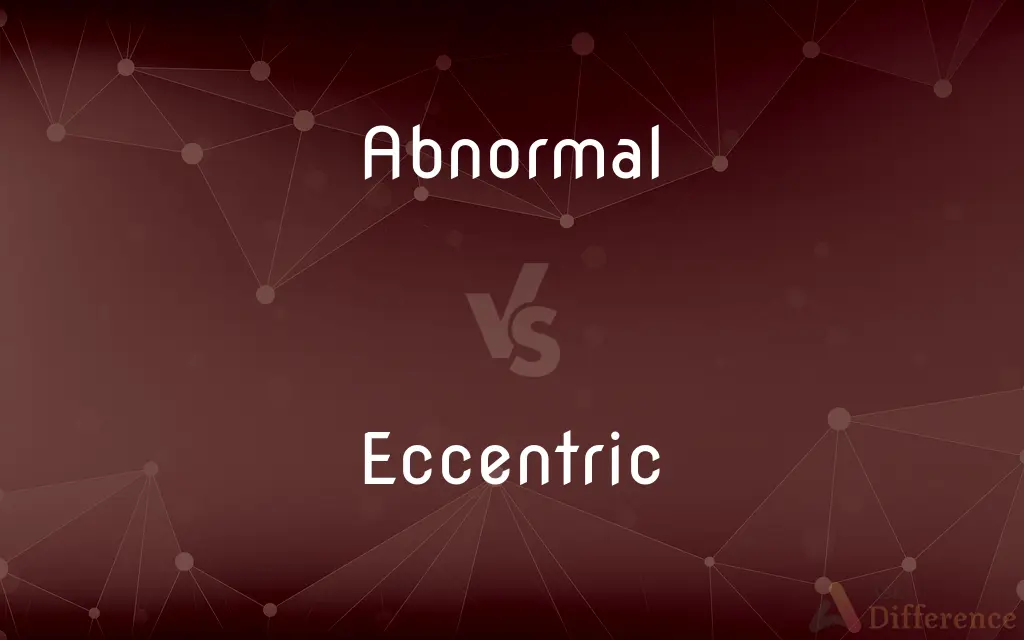Abnormal vs. Eccentric — What's the Difference?
By Tayyaba Rehman & Maham Liaqat — Updated on April 4, 2024
Abnormal deviates from what is standard or expected, often in a negative or harmful way, while eccentric describes unusual or quirky behavior that's not necessarily negative.

Difference Between Abnormal and Eccentric
Table of Contents
ADVERTISEMENT
Key Differences
Abnormal refers to a deviation from the norm that often implies a negative connotation, suggesting something is not only different but also undesirable or problematic. Whereas, eccentricity involves deviation from conventional behavior or appearance, but it's usually viewed in a more neutral or even positive light, emphasizing individuality without the implicit negativity.
Abnormal behaviors or conditions are often identified in medical, psychological, or social contexts, indicating something that may need correction or treatment. On the other hand, eccentricity is frequently celebrated as a hallmark of creativity, individuality, and non-conformity, not something to be "fixed."
In the realm of psychology, abnormality can be a diagnostic criterion that helps professionals identify and treat mental health issues. Eccentric individuals, however, may not display any psychological disorders; their behavior is simply unconventional.
Societally, abnormal behaviors or traits may be stigmatized or marginalized, leading to social exclusion or discrimination. Eccentricity, while it can also be met with misunderstanding, is often tolerated or even admired, especially when associated with artistic or intellectual prowess.
From a cultural perspective, what is considered abnormal in one context might be deemed eccentric or even normal in another, illustrating that these concepts are not only subjective but also heavily influenced by cultural norms.
ADVERTISEMENT
Comparison Chart
Definition
Deviating from what is normal or usual, typically in a way that is undesirable.
Deviating from conventional practices in a whimsical way.
Connotation
Often negative, implying a need for correction or treatment.
Neutral or positive, highlighting uniqueness without need for correction.
Context
Medical, psychological, and social realms.
Cultural, artistic, and individual expression.
Societal Response
Stigmatization, discrimination, or need for treatment.
Tolerance, admiration, or celebration of individuality.
Subjectivity
Highly subjective, with norms varying across cultures and times.
Celebrates personal choice and individuality; less tied to cultural norms.
Compare with Definitions
Abnormal
Not typical of the natural or usual formation.
The doctors noticed an abnormal curvature of the spine.
Eccentric
Characterized by unconventional choices or habits.
He led an eccentric lifestyle that fascinated everyone.
Abnormal
Unusual in a way that is unsettling or hard to understand.
The sudden change in his behavior was considered abnormal.
Eccentric
Unconventional or slightly strange behavior or style.
She’s known for her eccentric fashion sense.
Abnormal
Significantly different from the norm.
Abnormal psychology studies behaviors that differ significantly from societal norms.
Eccentric
Differing from the conventional, especially in whimsical or creative ways.
His eccentric decorating style made his house a local landmark.
Abnormal
Beyond the expected range.
The data showed an abnormal increase in temperature.
Eccentric
Not following the usual or accepted beliefs and opinions.
His theories were considered eccentric by his peers.
Abnormal
Deviating from what is normal or typical.
An abnormal test result may indicate a need for further medical evaluation.
Eccentric
Showing a readiness to act unpredictably.
The eccentric artist would paint outdoors even in the winter.
Abnormal
Deviating from what is normal or usual, typically in a way that is undesirable or worrying
The illness is recognizable from the patient's abnormal behaviour
Eccentric
(of a person or their behaviour) unconventional and slightly strange
He noted her eccentric appearance
Abnormal
Not typical, usual, or regular; not normal; deviant.
Eccentric
Not placed centrally or not having its axis or other part placed centrally
A servo driving an eccentric cam
Abnormal
Not conforming to rule or system; deviating from the usual or normal type.
Eccentric
A person of unconventional and slightly strange views or behaviour
He's seen as a local eccentric
Abnormal
Of or pertaining to that which is irregular, in particular, behaviour that deviates from norms of social propriety or accepted standards of mental health.
Eccentric
A disc or wheel mounted eccentrically on a revolving shaft in order to transform rotation into backward-and-forward motion, e.g. a cam in an internal combustion engine.
Abnormal
A person or object that is not normal.
Eccentric
Departing from a recognized, conventional, or established norm or pattern.
Abnormal
Not conformed to rule or system; deviating from the type; anomalous; irregular.
Eccentric
Deviating from a circular form or path, as in an elliptical orbit.
Abnormal
Not normal; not typical or usual or regular or conforming to a norm;
Abnormal powers of concentration
Abnormal amounts of rain
Abnormal circumstances
An abnormal interest in food
Eccentric
Not having the same center
Eccentric circles.
Abnormal
Departing from the normal in e.g. intelligence and development;
They were heartbroken when they learned their child was abnormal
An abnormal personality
Eccentric
Having the axis located elsewhere than at the geometric center.
Abnormal
Much greater than the normal;
Abnormal profits
Abnormal ambition
Eccentric
One that deviates markedly from an established norm, especially a person of odd or unconventional behavior.
Eccentric
(Physics) A disk or wheel having its axis of revolution displaced from its center so that it is capable of imparting reciprocating motion.
Eccentric
Not at or in the centre; away from the centre.
Eccentric
Not perfectly circular; elliptical.
As of 2008, Margaret had the most eccentric orbit of any moon in the solar system, though Nereid's mean eccentricity is greater.
Eccentric
Having a different center; not concentric.
Eccentric
(of a person) Deviating from the norm; behaving unexpectedly or differently; unconventional and slightly strange.
Eccentric
Against or in the opposite direction of contraction of a muscle (such as results from flexion of the lower arm (bending of the elbow joint) by an external force while contracting the triceps and other elbow extensor muscles to control that movement; opening of the jaw while flexing the masseter).
Eccentric
Having different goals or motives.
Eccentric
One who does not behave like others.
Eccentric
(slang) A kook; a person of bizarre habits or beliefs.
Eccentric
(geometry) A circle not having the same centre as another.
Eccentric
(engineering) A disk or wheel with its axis off centre, giving a reciprocating motion.
Eccentric
(physiology) An exercise that goes against or in the opposite direction of contraction of a muscle.
Eccentric
Deviating or departing from the center, or from the line of a circle; as, an eccentric or elliptical orbit; pertaining to deviation from the center or from true circular motion.
Eccentric
Not having the same center; - said of circles, ellipses, spheres, etc., which, though coinciding, either in whole or in part, as to area or volume, have not the same center; - opposed to concentric.
Eccentric
Pertaining to an eccentric; as, the eccentric rod in a steam engine.
Eccentric
Not coincident as to motive or end.
His own ends, which must needs be often eccentric to those of his master.
Eccentric
Deviating from stated methods, usual practice, or established forms or laws; deviating from an appointed sphere or way; departing from the usual course; irregular; anomalous; odd; as, eccentric conduct.
He shines eccentric, like a comet's blaze.
Eccentric
A circle not having the same center as another contained in some measure within the first.
Eccentric
One who, or that which, deviates from regularity; an anomalous or irregular person or thing.
Eccentric
In the Ptolemaic system, the supposed circular orbit of a planet about the earth, but with the earth not in its center.
Eccentric
A disk or wheel so arranged upon a shaft that the center of the wheel and that of the shaft do not coincide. It is used for operating valves in steam engines, and for other purposes. The motion derived is precisely that of a crank having the same throw.
Eccentric
A person with an unusual or odd personality
Eccentric
A person of a specified kind (usually with many eccentricities);
A real character
A strange character
A friendly eccentric
The capable type
A mental case
Eccentric
Conspicuously or grossly unconventional or unusual;
Restaurants of bizarre design--one like a hat, another like a rabbit
Famed for his eccentric spelling
A freakish combination of styles
His off-the-wall antics
The outlandish clothes of teenagers
Outre and affected stage antics
Eccentric
Not having a common center; not concentric;
Eccentric circles
Common Curiosities
What defines someone as abnormal?
Someone is considered abnormal if their behavior or characteristics significantly deviate from societal norms in a way that might indicate a problem or disorder.
Can abnormal behavior be positive?
Generally, abnormal behavior is viewed through a negative lens, focusing on deviations that are problematic, rather than positive.
Is eccentricity a choice?
Eccentricity can be both a conscious choice and a natural inclination towards unconventional behaviors.
Can someone be both abnormal and eccentric?
Yes, someone can exhibit behaviors that are both considered abnormal due to their significant deviation from the norm and eccentric due to their quirky nature.
How is abnormality measured?
Abnormality is often measured against cultural, social, and medical standards to determine how significantly a behavior or trait deviates from what is expected.
Why is eccentricity valued in some cultures?
Eccentricity is often valued for its association with creativity, freedom of expression, and the breaking of conventional boundaries.
What is the difference between being unique and being eccentric?
Being unique involves having individual characteristics that set one apart, while being eccentric specifically refers to unusual or quirky behaviors or beliefs.
How do personal and cultural backgrounds influence perceptions of abnormality and eccentricity?
Personal and cultural backgrounds heavily influence what behaviors are considered normal, abnormal, or eccentric, reflecting diverse values and tolerances.
What are examples of eccentric behavior?
Examples include wearing unusual clothing, having an unconventional living arrangement, or engaging in quirky hobbies.
Can abnormal behaviors be corrected?
Some abnormal behaviors, especially those stemming from medical or psychological issues, can be addressed or managed with treatment.
Is abnormal always unhealthy?
Not all deviations considered abnormal are unhealthy; the context, extent of deviation, and impact on well-being are crucial factors.
Can eccentricity be harmful?
While generally not harmful, extreme eccentricity can sometimes lead to social isolation or misunderstanding.
How do societies decide what is abnormal?
Societies base their judgments on cultural norms, moral values, and often on collective opinions of what constitutes healthy or acceptable behavior.
Are eccentric people aware of their eccentricity?
Many eccentric individuals are fully aware of their uniqueness and embrace it, though awareness can vary.
Can societal views on what is abnormal or eccentric change over time?
Yes, societal views can evolve, often becoming more inclusive or accepting of diversity in behaviors and expressions.
Share Your Discovery

Previous Comparison
Setting vs. Context
Next Comparison
Revolve vs. RevolutionAuthor Spotlight
Written by
Tayyaba RehmanTayyaba Rehman is a distinguished writer, currently serving as a primary contributor to askdifference.com. As a researcher in semantics and etymology, Tayyaba's passion for the complexity of languages and their distinctions has found a perfect home on the platform. Tayyaba delves into the intricacies of language, distinguishing between commonly confused words and phrases, thereby providing clarity for readers worldwide.
Co-written by
Maham Liaqat















































